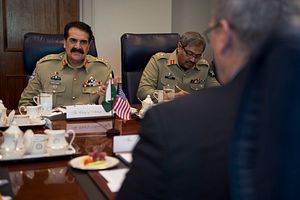General Raheel Sharif, Pakistan’s chief of army staff, announced on Monday that he would retire at the end of his term on November 29, 2016, forgoing the option of extending his time on the job. “I do not believe in extension and will retire on the due date,” Sharif said on Monday. His predecessors Ashraf Pervez Kayani and Pervez Musharraf availed of an extension (the latter also ruled as president after a coup in 1999).
Sharif’s decision to retire puts him out of sync with his immediate predecessors and restores a degree of predictability to Pakistan’s military leadership. Before Musharraf, going back all the way to Muhammad Zia-ul-Haq, Pakistan’s military dictator in the late-1970s and 1980s, every chief of army staff left the post within three years. Sharif’s decision to publicly announce his intention to retire well in advance of the November 2016 deadline can thus be seen as a positive development.
Pakistan’s military has ruled the country for most of its 67-year history. Nawaz Sharif’s (no relation to the general) election in 2013 marked the first successful transfer of power from one democratically elected government to another in the country’s history. Now, Raheel Sharif’s decision to retire by the customary deadline preserves at least the appearance that civilian supremacy persists in Pakistan.
However, while Sharif is breaking with his predecessors in his decision to retire, he has not broken with them in terms of moving the Pakistani military away from exercising undue influence over the country’s foreign and security policy. The civilian government under the prime minister remains weak–particularly since widespread populist protests against its legitimacy in the second half of 2014. As his term has gone on, the general has stepped up the visibility of the military in the country’s security policy. Notably, complaints from Pakistan’s neighbors about the Pakistani military’s continued support for militants have persisted throughout Sharif’s tenure.
As I discussed back in 2013, when it was announced that Sharif would replace Kayani, there were some hopes initially that Sharif would be a different sort of Pakistani chief of army staff. Notably, his background revealed a special interest and competency in domestic counter-insurgency, suggesting that he would be the man to bring the hammer down on Pakistan’s domestic terrorists, including the Tehreek-e-Taliban Pakistan (TTP).
Under Sharif, Pakistan launched Operation Zarb-e-Azb, a major military campaign to pacify the country’s porous border with Afghanistan of TTP fighters and affiliated militants hostile to the legitimacy of the Pakistani state. However, Sharif appeared to be less interested in the prospect of attacking high-level leaders in groups focused on external targets, including the Haqqani network. This latter shortcoming of the Sharif-led campaign led to a rift with the United States, Pakistan’s ally, over U.S. reimbursements for the Pakistan’s military efforts.
Regardless of battlefield outcomes, Raheel Sharif’s reputation and legacy in Pakistan are befitting of the power traditionally held by men in his position. As several analysts have detailed, Sharif became incredibly popular among ordinary Pakistanis, particularly after nationwide anxieties over counter-terrorism reached a tipping point after the devastating massacre of over 130 schoolchildren in Peshawar in December 2014.
Sharif came to be seen as the platonic ideal of the Pakistani “soldier-statesman,” as the Wall Street Journal noted last October. A cult of personality not of his own making permeated the country–the #ThankYouRaheelSharif hashtag took off and the general’s face came to emblazon even men’s underwear.
Despite this surge of adoration in 2015, Sharif appeared determined to ward off any perception that the Pakistani military would move overtly to undermine the leadership of the civilian government. Even when the government of Nawaz Sharif appeared to bend under the weight of widespread populist protests in 2014, Sharif explicitly set aside the idea of a coup. In his view, a coup wouldn’t be necessary to ensure that the military had a say where it mattered most.
Curiously, Raheel Sharif, far more so than Kayani and Musharraf, appears to somewhat genuinely believe in the Pakistani military’s endurance as an institution beyond the time of a single man. Make no mistake: Sharif fervently believes in the idea of Pakistan and the idea of the Pakistani military as existing first and foremost in opposition to India. (The general’s elder brother, Shabbir Sharif, died in the 1971 war with India.) On his view that the Pakistani military establishment is greater than him, Sharif is no doubt correct. For discontents of Pakistani security policy in Kabul and New Delhi, this will be no solace.
Indeed, even if Sharif keeps to his word and leaves the chief of army staff vacant for a successor on November 29, 2016, there will be little reason to expect his successor to change the overall contours of Pakistan’s security policy. The Pakistani military has robust command-and-control and a clear hierarchy, but the institution’s ethos pre-dates Raheel Sharif and will persist long after he’s gone.

































